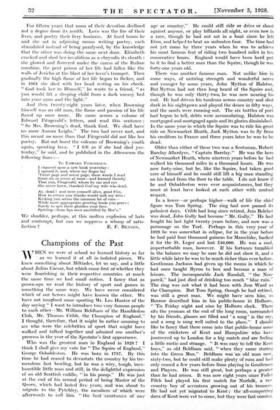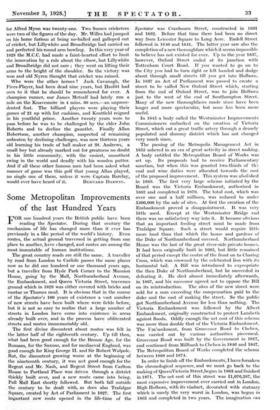Champions of the Past
HEN we were at school we learned history as far NV- as we learned it at all in isolated pieces. We knew something about Miltiades, let us say, and a little about Julius Caesar, but which came first or whether they were flourishing in their respective countries at much the same time we had small notion. I fancy that as grownnps we read the history of sport and games in something the same way. We have never considered which of our heroes might have known the other. We have not imagined some sporting Mr. Leo Hunter of the day saying " I want to introduce two very famous people to each other--Mr. William Beldham of the Hambledon Club, Mr. Thomas Cribb, the Champion of England." I thought, therefore, that it might be rather amusing to See who were the celebrities of sport that might have ' walked and talked together and admired one another's prowess' in the year of the Speetatoi's first appearance.
WhO was the greatest Man in England in .1828 ? I think I shall give my vote for " The Squire of England," George Osbaldeston. He was born in 1787: By this time he had ceased' to deVaState the'cOuntry by his tre- ' mendous fast bowling, but he was a wiry, tough, inex- ' hatistible little man and still, in the delightful expression • of an old Scottish caddie, " in his pomp." He Was just at the end of his second period of being' Master of the Quorn, which had lasted' five years; and "Was about to migrate to the, Pytchley; the member's'. of whieh were` • afterwards to call hint " " the best "Portsrilan Of any- age or country." He &add still rick- or chive o= shoot against anyone, or play billiards all night, or even row in a 'race, though' he had not sat in a boat since he left Eton, and helped to beat an unbeaten four. The time had not yet Come by three years when he was to achieve his 'most fanibuS feat of riding two hundred miles in ten consecutive hours. England would have been hard put to it to find a -better man than the Squire, though he was forty-one years old.
There was another famous man. Not unlike' him in some ways, of Untiring strength and wonderful nerve and younger by some years, John Mytton of Easton. But Mytton had not then long heard of the Squire and, though he was only thirty-two, he was now nearing his end. He had driven his tandems across country and shot duck in his nightgown and played the deuce in fifty ways, and the sands were running out. The six bottles of port had begun to tell, debts were accumulating, Ralston was mortgaged and mortgaged again and its glories diminished. In the same year in which the Squire was to ride his great ride on Newmarket Heath, Jack Mytton was to fly from his creditors to France and three years later he was to be dead.
Older than either of these two was a Scotsman, Robert Barclay Allardyce, " Captain Barclay." He was the hero of Newmarket Heath, where nineteen years before he had walked his thousand miles in a thousand hours. He was now forty-nine; but he, like the Squire, had taken good care of himself and he could still lift a big man standing on his hand from the floor to the table. I do not know( if he and Osbaldeston were ever acquaintances, but they must at least have looked at each other with mutual respect.
In a lower—or perhaps higher—walk of life the chief figure was Tom Spring. The ring had now passed its palmiest days. Cribb had long since retired, Jem Belcher was dead, John Gully had become " Mr.,Gully." He had fought his last fight twenty years before, and now was a personage on the Turf. Perhaps in this very year- of 1828 he was somewhat in eclipse, for in the year before he had paid four thousand guineas for Mamelhke, backed it for the St. Leger and lost £40,000. He was a Cool, imperturbable man, however. If his fortnneS trembled in the balance we may be sure he did not shoW it, and a little while later he was to be much richer than ever before. Gentleman Jackson had given up the rooms in Which' he had once taught Byron to box" and become a man of leisure. The incomparable Jack Randall; " the Non- pareil," had just died of drinking too much "-blue ruin.'' The ring was not what it had been with Jem Ward :as the Champion. But Tom Spring, though he had retired, was still a great man. We might haVe seen him; as Borrow described him in his piablic-houge iii Holborn, " 'Tis Friday night and nine by Holborn Clock. There sits the yeoman at the end of the long room, surrounded by his friends, glasses are filled and ' a song'' is the cry, and a song is sung well suited to the place." I.shOuld like to fancy that there come into that public-house` some of the cricketers of Kent and Hampshire' whO have journeyed up to London for a big match and are feeling a little rustic and strange. " It *as easy to tell the Kent boys," as old Beldham 'said, " when they came staring into the Green Man." • Beldham was 'an "old 'man now, sixty-two, but he could still make plenty of runs and had only ceased a few years before from plaYing:in Gentlemen and Players. He was still great, but perhaps a"greater than he had arisen. It was now eight years since Fuller Pilch had played his first match for -Norfolk, 'a -raw country .boy of seventeen growing out of his trousers. He had not yet Migrated' to Kent ; the'all-conquering days of Kentivere vet to come, but they Were' fast' coming, for Alfred Mynn was twenty-one. Two Sussex cricketers were two of the figures of the day. Mr. Willes had jumped on his horse furious at being no-balled and galloped out of cricket, but Lillywhite and Broadbridge had carried on and perfected his round arm bowling. In this very year of 1828 the M.C.C. had made a faint-hearted effort to limit the innovation by a rule about the elbow, but Lillywhite and Broadbridge did not care ; they went on lifting their arms to the height of the shoulder. So the victory was won and old Nyren thought that cricket was ruined. Who were the other heroes ? Jack Cavanagh, the Fives-Player, had been dead nine years, but Hazlitt had seen to it that he should be remembered for ever. A champion runner, our James Metcalf had lately run a mile on the Knavesmire in 4 mins. 30 secs.—an unprece- dented feat. The billiard players were playing their games of 21 up with list cushions, and Kentfield reigned in his youthful prime. Another twenty years were to pass before he was to be challenged by the elder John Roberts and to decline the gauntlet. Finally Allan Robertson, another champion, suspected of remaining unbeaten by declining challenges, was now thirteen years old learning his trade of ball maker at St. Andrews, a small boy but already marked out for greatness no doubt in his little community, with the easiest, smoothest swing in the world and deadly with his wooden putter. And if all these other famous, men had been asked what manner of game was this golf that young Allan played, no single one of them, unless it were Captain Barclay,



















































































































 Previous page
Previous page